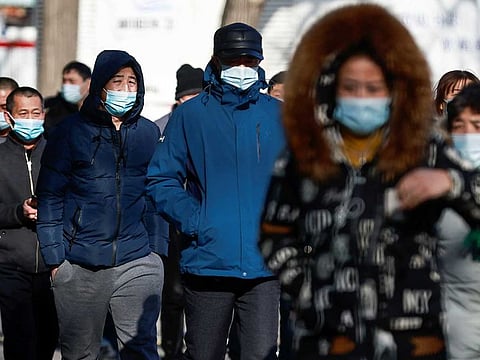Global COVID-19 death toll at 2 million as WHO battles new strains
Europe recorded 30,003,905 cases, nearly a third of the worldwide total

Paris: The worldwide death toll from coronavirus approached two million on Friday, with Europe topping 30 million infections and World Health Organization experts working on advice to fight new, more contagious strains of the disease.
The soaring number of fatalities - 1,994,833 - is matched by the spread of infections with Europe recording 30,003,905 cases, nearly a third of the worldwide total, according to an AFP tally based on official statistics.
Adding to the run of terrible milestones, Germany, Europe's biggest economy, hit two million infections.
Many countries are doubling down on virus restrictions, with vaccination drives still in their infancy.
Portugal entered a fresh lockdown Friday while Britain began requiring negative tests for entry, and fresh curbs on populations were announced from Brazil to Lebanon.
German Chancellor Angela Merkel is pushing for a "significant" tightening of curbs to slow the infection rate as the European Union's most populous country added more than 22,000 new cases.
She said she wanted to bring forward crisis talks with regional leaders, participants at a meeting of her centre-right CDU party told AFP.
The virus could only be stopped with "significant additional measures" and people urgently needed to reduce social contact, Merkel reportedly said.
At the Meissen crematorium in Germany's Saxony state, coffins were stacked up to three high, or even stored in hallways, awaiting cremation.
Manager Joerg Schaldach, 57, said anyone still denying the severity of the pandemic should take a look at the bodies piling up.
"This is heavy work, so why don't the Covid-19 deniers come and do it," he said. "We have a disastrous situation here."
'Worrying'
Germany has fared better than many of its European neighbours in the pandemic, with France, Italy, Spain and Britain all recording more infections despite smaller populations.
Britain on Thursday said it would ban all arrivals from South American countries from Friday, over fears of importing a new coronavirus strain.
"I've taken the urgent decision... following evidence of a new variant in Brazil," said Transport Secretary Grant Shapps.
The new strain, known as E484K, has raised alarm among researchers over its possible impact on immunity.
Partly over fears of new variants, France said it would impose a daily nationwide curfew at six pm starting Saturday and remaining in force for at least two weeks.
Most of France had already been under an eight pm curfew, with some areas, especially in the hard-hit east, already under the six pm limit.
Brazil's northern Amazonas state also announced a curfew from seven pm to six am as the health system is pushed to breaking point in the state capital Manaus.
Global health experts were expected on Friday to issue recommendations to stem the spread of this variant and other new strains, which the WHO called "worrying".
"When you first met almost a year ago, just 557 cases of the disease we now call Covid-19 had been reported to the WHO," director-general Tedros Adhanom Ghebreyesus told Thursday's emergency meeting in Geneva, which had been brought forward two weeks.
$1.9 trillion stimulus plan
Scientists see large-scale vaccination as the way out of the crisis but 95 percent of doses so far administered have been limited to just 10 countries, according to the WHO.
Progress on administering vaccines has often been slow.
India's mammoth immunisation programme will begin on Saturday. In the United States around 10 million people have received a first shot.
In Africa, Senegal said it would launch vaccinations by the end of March and Nigeria announced it would have 10 million vaccine doses by the end of the same month.
Nigeria, Africa's most populous nation with 200 million people, has officially reported 104,000 Covid-19 cases, of which 1,382 have been fatal. But the figures are believed to fall short of the real toll.
US policymakers are focused on addressing the economic damage from the pandemic, with President-elect Joe Biden unveiling a proposal for a $1.9 trillion relief package aimed at revitalising the world's largest economy.
He aims to raise the federal minimum wage to $15 an hour, help struggling state and local governments, safely reopen schools, boost the vaccination campaign and raise the size of stimulus cheques.
"In this moment of crisis... we cannot afford inaction," Biden said.
Sign up for the Daily Briefing
Get the latest news and updates straight to your inbox







